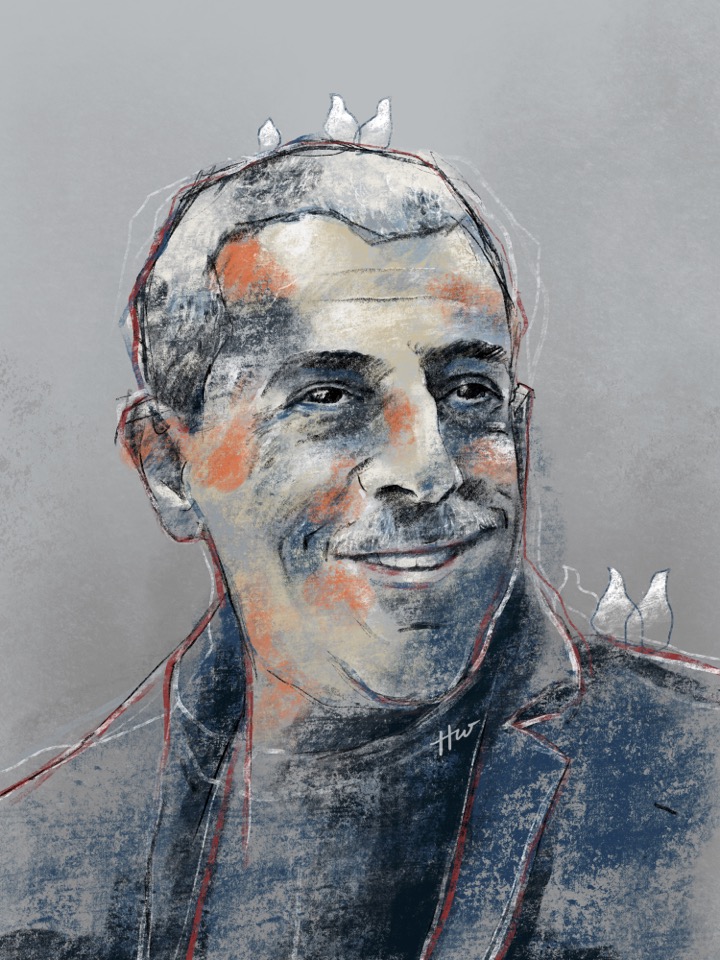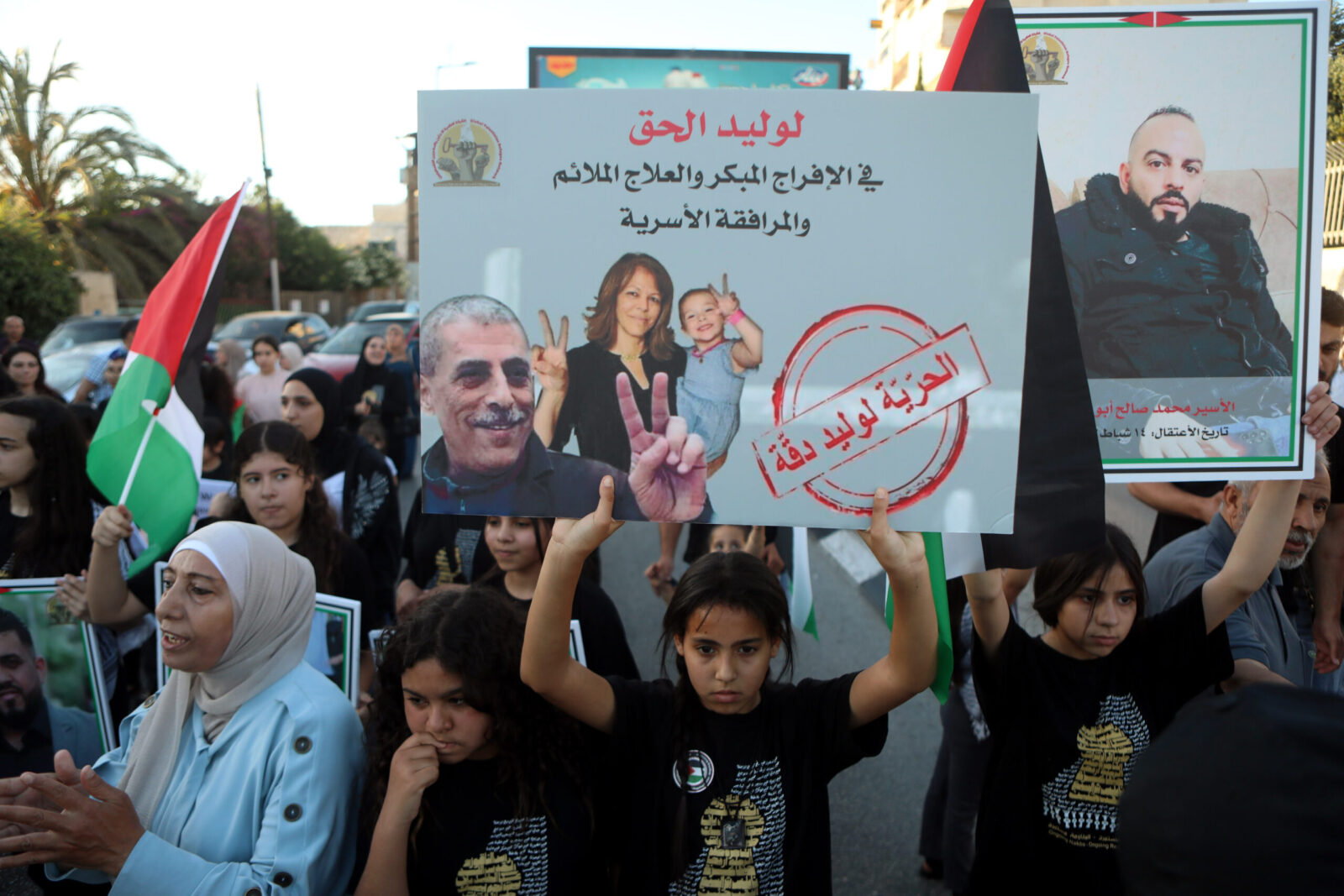“For a long time whenever Milad asked me on the phone, ‘Daddy, where are you?’ I avoided using the word ‘prison.’ I feared that it might be too much for her at her tender age to begin to live with this word and its weighty implications,” writes Walid Daqqah in his essay, “A Pace without a Door.”

Portrait of Walid Daqqah by artist and architect Hazem Abutawila.
The 61-year-old Palestinian political prisoner and writer was arrested in 1986 and sentenced to a 37 years in Israeli prison. His sentence should have come to an end in 2023 but was extended by Israeli authorities for two years over the smuggling of mobile phones. As Sana’ Salameh, Daqqah’s wife, whom he married in 1999 while in prison, recently wrote, “In other, similar cases, such offenses were punished with a few days of solitary confinement. In Walid’s case they added two years.” Salameh and other activists view Daqqah’s continued detainment as, in actuality, punishment for his defiance, most prominently the smuggling of his sperm to conceive the couple’s daughter, Milad—born in 2020—after Israeli authorities illegally prohibited them from conjugal visitations.
In December of 2022, Daqqah was diagnosed with terminal bone marrow cancer. Despite the severity of his diagnosis, he continues to be denied release as well as vital, life-prolonging treatments. “They have in the past delayed transferring him to the hospital, until it’s almost too late,” writes Salahmeh. “This policy of medical neglect is well known. We call it a policy of slow killing.”[1]
In March of 2023, his family launched a social media campaign, #FreeWalidDaqqa. As part of the campaign for his release, a handful of his essays have been translated from Arabic into English by Dalia Taha, a Palestinian poet and playwright. These essays, smuggled out of prison, include the two below: “A Place without a Door” and “Uncle, Give Me a Cigarette.” Other works by Daqqah include, Parallel Time (later adapted as a play), Dissolving Consciousness, or: Redefining Torture and his children’s novel, The Tale of the Oil’s Secret.
A Place without a Door
Once, after she had returned from a trip to the ocean, I promised Milad on the phone that I would take her there next time. She paused for a few seconds, hesitant to respond, as if she didn’t want to shock me before finally saying, “No, you don’t have a door.”
For a long time whenever Milad asked me on the phone, “Daddy, where are you?” I avoided using the word “prison.” I feared that it might be too much for her at her tender age to begin to live with this word and its weighty implications. Torn, I grappled with the question of whether I should nevertheless tell my daughter the truth? Or should I hide the bitter reality, to prevent the connotations of the word prison from lodging in her imagination?
Through her visits, Milad came to understand what a prison is, long before she learned the meaning of the word. To her it was a place without a door. Where her father was confined, which he was unable to leave. And for her, if there was no door, then there could be no visit to the ocean. No breakfast to share. And no chance for me to accompany her to the nursery she fondly referred to as “school.”

Protesters gather to hold a demonstration demanding the release of Walid Daqqa in Bethlehem, West Bank on June 7, 2023. His wife and daughter appear in the poster behind him. Wisam Hashlamoun/Anadolu Agency via Getty Images
From the earliest moments of their lives our children come to understand the reality of walls, barriers and checkpoints. They do so long before they are introduced to the word “occupation.” So we ask ourselves a vexing question, one that is of the utmost importance to their education: How do we turn the oppressive feeling created by this reality into a force for positive action, which could contribute to the constructive growth of their young and developing personalities?
While thinking about whether I should use the word “prison” with Milad, memories from my years of captivity began to play in my mind. During these years, I found myself living alongside not just one but three generations of prisoners: the Father, the Son, and the Grandson. Perhaps it is the pervasiveness of prisons in the lives of children, through their frequent visits to incarcerated family members, which brings them back to the confines of the prison as prisoners themselves. In one of my stories from life in prison, entitled “Uncle, Give Me a Cigarette,” a 12-year-old child prisoner asked me for a cigarette. In normal circumstances, outside the walls of the prison, I would have said no. We don’t want children to smoke. But in this environment, it struck me that the child wanted by this request to grow up quickly so that he could better confront the years of confinement that now loomed before him or perhaps recover from the violence of his arrest. By the act of smoking, he seemed to proclaim “behold me, an adult.” So I handed the child a cigarette. And in the presence of Milad, I finally spoke the word “prison.” In the end, I followed Milad’s own cue to me. She had taught me the importance of honesty and truthfulness when raising children. In the end, it did not matter if she heard me use the word “prison.” In her heart she had already felt what it meant. It is a place without a door.
“Uncle, Give Me a Cigarette”
It is morning and I hear the jangling of two sets of handcuffs as the prison guard approaches us. He throws them to the ground, clanging against the concrete floor, and a sense of calm settles over the room. There’s one bundle to tie the hands, and another, with longer chains, to tie the legs. Eight pairs of handcuffs of each kind, for seven prisoners.
I stand with the others in the middle of a small yard, ringed by holding cells, and try to lean against the wall. I am tired of being moved between prisons since we started the open hunger strike. I gather my energy and try to take in as much air as possible in preparation for a journey that will last hours inside an iron box that in this heat quickly turns into an unbearable furnace.
Once he is finished handcuffing us, the guard heads off for the prisoner transport truck. And then I hear a voice emanating out of the cell behind me…
“Uncle, give me a cigarette.” I peer into the cell’s darkness but cannot see anyone, and for a moment I think I am delirious. Then the voice issues out of the cell again, this time louder and more desperate. “Uncle, my uncle, give me a cigarette!” I stare into the cell again and call to the voice.
“Where are you?!”
“I’m here, down here!”.
Hunching down, I peer through the slot in the bottom of the door through which prisoners receive their food and have their hands tied before being let out of the cell, and I see a child, not older than twelve years old. A child asking for a cigarette.
I didn’t know how to respond to him. Should I give him a cigarette, I wondered, or should I educate him about the dangers of smoking in the way that adults do with children outside prison? Adults, adults…and then I am struck by the fact I am including myself in this category. By the fact that he called me “uncle.” Am I so old already?
I was suddenly terrified by being addressed in this manner. It was the first time during my 26 years of imprisonment that I have met someone speaking to me across such a distance of age. In prisons we are used to not addressing each other in this way, with social honorifics marking our age. Regardless of what our age differences may be, we all address each other as “my brother” or “comrade” and, more recently, “fighter.”
Both of us were fearful. I was fearful for the time that had passed and he was fearful of what had not yet passed. I was afraid of the past and he was afraid of the future. I was afraid of having lived a life that had burnt out in prison, and he was afraid of what the cigarette that was now lodged between his lips could not burn away. The cigarette became something else after he had exhaled and so did he, standing tall now on his toes, appearing now older than his age. The ember glow became a lantern in his hand, chasing away the darkness of the cell, dispelling his fear and loneliness.
He was not smoking but trying to dispel the image of a child that so incontrovertibly clung to him. In the world of the prison, in the face of the cruelty of its guards, childhood is a burden. Knowing that he was to face years of imprisonment, he was seeking to rid himself of his vulnerability and innocence, for which he clearly had no further use–it having made no difference to the judge that had sentenced him to four years.
The guard came back for us, picked the eighth pair of handcuffs up from the concrete floor, and barked at the child to push his hands through the slot in the door. So the child pushed them through still holding the cigarette between his fingers. The guard shouted at him to drop the cigarette and then muttered to himself in Hebrew, bemoaning the sight of a child smoking. Nevertheless he proceeded with the handcuffing, remaining unmoved by the sight of those small hands in handcuffs. Because the child’s wrists were too small, however, he struggled several times to secure the handcuffs, and finally decided to use them to chain the boy’s legs.
When he was moved out of the cell, in preparation for the transportation, I looked at him and imagined that he was my own son, such as fate had not yet wanted to bring into the world. I wanted with every strain of my being to hug him and as these paternal feelings surged through me, I felt an overwhelming desire to cry. But I hid my feelings. I did not want to shatter the image of the man that he wanted now to become. I walked over to him, so as to shake his hand as a comrade, and a rival, asking
“How are you, fighter?”
Endnotes
[1] Sana’ Salameh, “Free Walid Daqqah and all political prisoners,” Mondoweiss (March 29, 2023).
